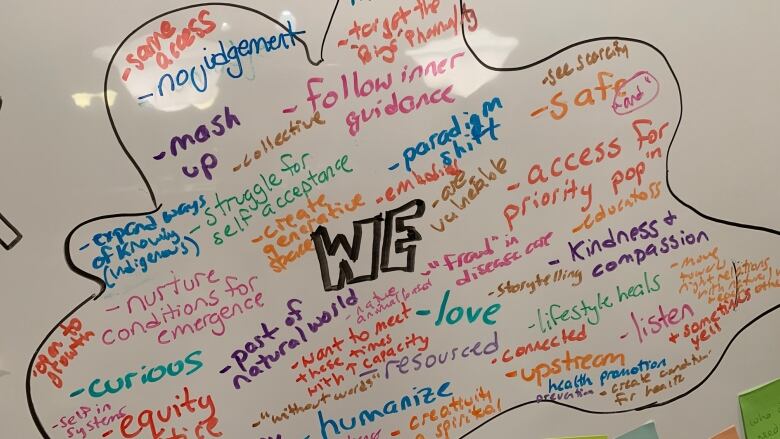Calgary organization designs music and breath work program to help with pandemic mental health challenges
The Healing Centred Cooperative's project focuses on immigrant and refugee communities

With $96,000 in funding from the City of Calgary'sChange Can't Wait initiative, The Healing Centred Cooperative is designing a music and breathwork program to help people facing mental health challenges from the pandemic.
The first phase of the project focuses on immigrant and refugee communities.
Christine Gibson, a family doctor and the founder of The Healing Centred Cooperative, said that while there is a huge need for mental health supports in general since the pandemic, with high rates of anxiety and stress across the country, these issues are compounded in certain communities.
"You add a person who's forced to be exposed because they're an essential worker or they've been not able to isolate because of child care issues orfinancial issues, [then] there's just so much more stress on certain kinds of families," said Gibson.
"Especially in Calgary, the pandemic very much was racialized. So the people who were disproportionately having very high rates of COVID were in neighbourhoods with a lot of newcomer families."
Approaching mental health with music
Gibson said there are two ways to approach mental health and trauma: a "top-down" approach, which starts from the brain and goes to the rest of the nervous system, like with cognitive behavioural therapy.
The second is "bottom-up" approach, which starts with the body. This is what the music and breathwork program aims to do.
It takes inspiration from a program from the English National Operathat uses breathing techniques and English lullabiesto help people recovering from COVID-19 who are still suffering from "breathlessness and associated anxiety."
Gibson said their program will work with newcomer communities to determine what music and exercises will be most helpful, based on how different cultures use music and rhythm for healing, as well as individual preferences.
Tiffany Sparrow, a music therapist helping to design the program, said that music is an effective tool for mental health because of its "variety and versatility."
She said music can support different domains of wellness and that it's not just limited to an emotional response,there are physiological benefits too.
"When we're talking the implications of mental health around COVID, we might be talking about things like reducing anxiety, increasing relaxation and helping with reducing the fight-flight-freeze response," said Sparrow.
"Music paired with breathing can be really useful to help totone the vagus nerve and decrease these fight-flight-freeze responses."
While the program is still being designed, Sparrow said exercises like breathing patterns used in yoga, with a shorter inhale and longer exhale, or humming, can help promote relaxation.
"[Humming] has the added effect of making sounds which can serve as a focal point for your mind, if we're trying to take it away from thoughts that might be anxiety-promoting," said Sparrow.
"And then feeling the visceral feeling of a hum like right in your face can provide some a little massage kind of effect, for your chest, for your face, for your forehead, and help to further enhance that relaxation response."
Gibson is also confident that music and breathwork can help people suffering from long COVID symptoms. Once the virtual program is fully designed in early 2022, she wants to take it to long COVID clinics to help bring people back to a place of wellness, both mentally and physically.
"A lot of mental health services are not accessible or acceptable to all people," said Gibson. "And so our intention is to be very low barrier."












_(720p).jpg)


 OFFICIAL HD MUSIC VIDEO.jpg)
.jpg)



























































































